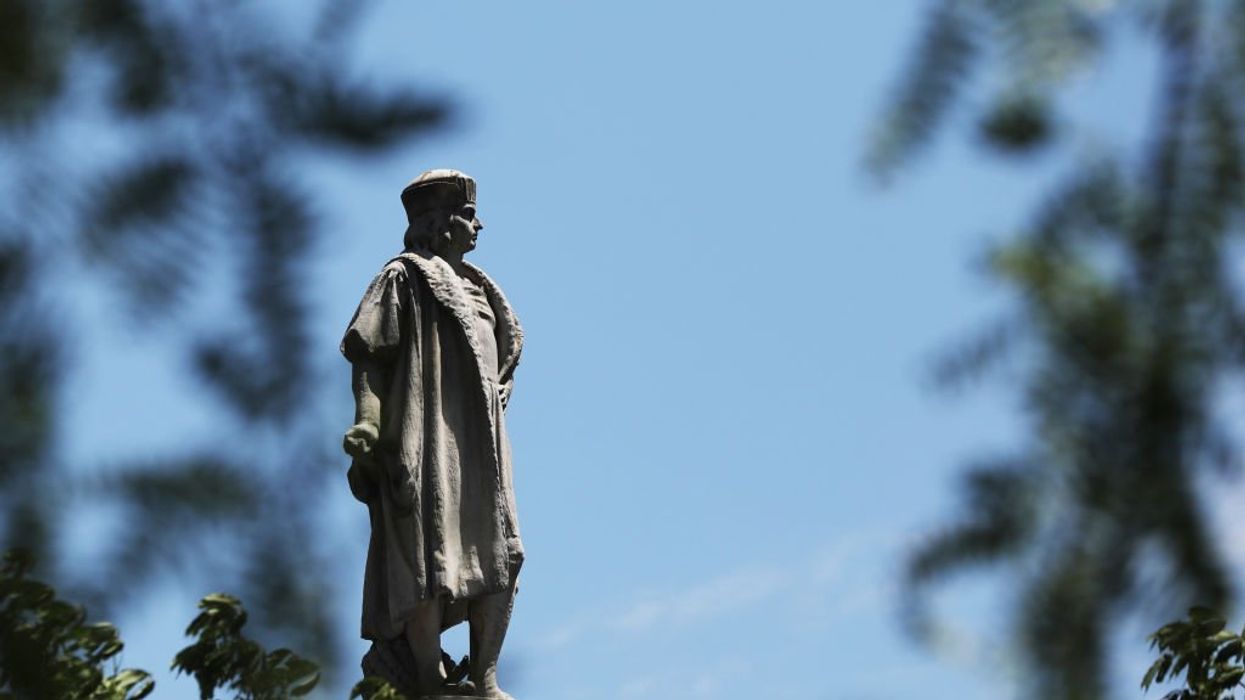
Spencer Platt/Getty Images

“Let those who are accustomed to finding fault and censuring ask, while they sit in security at home, ‘Why did you not do so and so under such circumstances?’ I wish they now had this voyage to make. I verily believe that another journey of another kind awaits them, or our faith is nothing.” So wrote Christopher Columbus of his contemporary critics, demonstrating his humor, diplomacy, and faith. All three were instrumental in his tumultuous career as an explorer and colonial governor.
His letter also makes it clear that our current anti-Columbus sentiment has been in fashion before. When Columbus refused to allow the Spanish settlers of the West Indies to enslave the natives, they summoned one Francisco de Bobadilla from the homeland. Eager to claim the spoils of the colony for his own, Bobadilla fabricated accusations against Columbus and shipped him and his brothers back to Spain in chains. He then proceeded to establish a reign of slavery, rape, and murder often carelessly attributed to the man he deposed.
The truth is, despite incomplete, out-of-context quotes to the contrary, Columbus respected the indigenous people he encountered and wished to make them both Spanish citizens and Christians. Born into obscurity to a Genovese wool weaver, Columbus was a self-made man and an impressive autodidact. He was also a man of vision, determination, and courage, embarking on a journey many discouraged (it took Columbus eight years and multiple rejections to secure funding) and few dared attempt. He was one of the first immigrants to the New World, and like many immigrants after him, he faced his share of injustice and prejudice. But he bore his struggles with grace and dignity, leaving a heritage that all Americans should claim with pride.
If you know any young people who have recently encountered Howard Zinn for the first time, a useful corrective on the subject of Columbus is Samuel Eliot Morison’s masterful “Admiral of the Ocean Sea.” Or perhaps they just need a thrilling, true-life tale to activate their own dormant sense of adventure. For that, I recommend Apsley Cherry-Garrard’s “The Worst Journey in the World,” his account of Robert Falcon Scott's ill-fated Terra Nova Antarctic expedition of 1910-1913.
Young, inexperienced, and unqualified, Garrard was an Oxford-educated aristocrat who won his place on the crew through connections, persistence, and a sizeable donation. However, he quickly proved to be an asset, not least because he could withstand the freezing temperatures, poor visibility, and near-starvation without complaint.
Fortunately for the reader, Cherry-Garrard is not so taciturn on the page, leaving us with an elegantly written, witty, and unsparing look at a venture gone horribly wrong. Beaten to the South Pole by Norwegian explorer Roald Amundsen, Scott and four of his men died on the return journey. They managed to carry everything with them to the very end, including diaries and the first Antarctic fossils. Though ultimately the record of a failure, “The Worst Journey in the World” survives as a testament to their courage and resolve.
With typical understatement, Cherry-Garrard called his adventure “the cleanest and most isolated way of having a bad time which has been devised.” Such character-fortifying and mettle-testing ordeals may not be easy to come by for most of us, but it could be that we are called to chart a different, if also hazardous, course.
History may be written by the victors, but those currently revising our national story do so in a distinctly loserish spirit. They are less guided by zeal for truth than by resentment and self-aggrandization; in their hands the past is primarily a weapon with which to demand status and power for their particular aggrieved tribe. But this frenzied, compulsive “debunking” diminishes us all.
The American founding, like all foundings, rests on both historical fact and edifying myth. To keep this country together, we have to clarify the former while restoring the latter. Today, the holiday formerly known as “Columbus Day,” is as good a time as any to start.
Editor's note: This essay was originally published in 2023.